Grateful: How do you answer that age-old question about what you're thankful for this year?
It would be perfectly understandable if people balked this year at answering that annual and sometimes, unpalatable, question: What are you grateful for this Thanksgiving?
Between the uncertainty and challenges that are part of life at any time, and the lingering daily effects of a devastating global pandemic, it would be easy to pass the query on down the table along with the yams.
But check around. Maybe more than ever, asking that question can start a needed conversation about shared values, stories, hopes and goals.
FLORIDA TODAY asked the gratitude question of four people across Brevard: Dorothy Linson, a woman who's fed the south Brevard community every Thanksgiving for 21 years. Michelle and Paige Green, a Merritt Island couple who welcomed Michelle's mother, Norma, into their home in 2014 and struggled, together, through Paige's COVID battle — only to say goodbye to Norma in October. Officer David Porter, a Palm Bay community resource officer who sometimes sees the best and worst of humanity in one shift.
This group of Brevard residents might never find themselves sitting around the same Thanksgiving table and yet what matters to them is strikingly similar.
They love their families. Would do anything for them. They treasure community. Challenges aside, they can still envision a world where no one's hungry or homeless or dies alone.
And this, perhaps, above all, unites them: They're filled with gratitude.
Gratitude for each opportunity to take on the problems that exist in every community — and maybe, just maybe, change someone's day. Or even their life
For the promise they see in someone who's just getting back on their feet.
For the honor of being at someone's side as they leave this world.
They're grateful.
A heartbreakingly special time
It's going to be a very different Thanksgiving for Michelle and Paige Green this year.
They might go out to eat. Nothing special; no $50-a-plate dinner.
Just the two of them. Just casual.
After the pressure of the past 18 months or so, wherever they dine and whatever's on the menu, it will be as special as an exquisite meal in a five-star restaurant.
This time last year, there were three in the couple's house on Merritt Island.
The two had welcomed Michelle's mother, Norma Cross, in December 2014, with the older woman eventually moving in with the Greens.
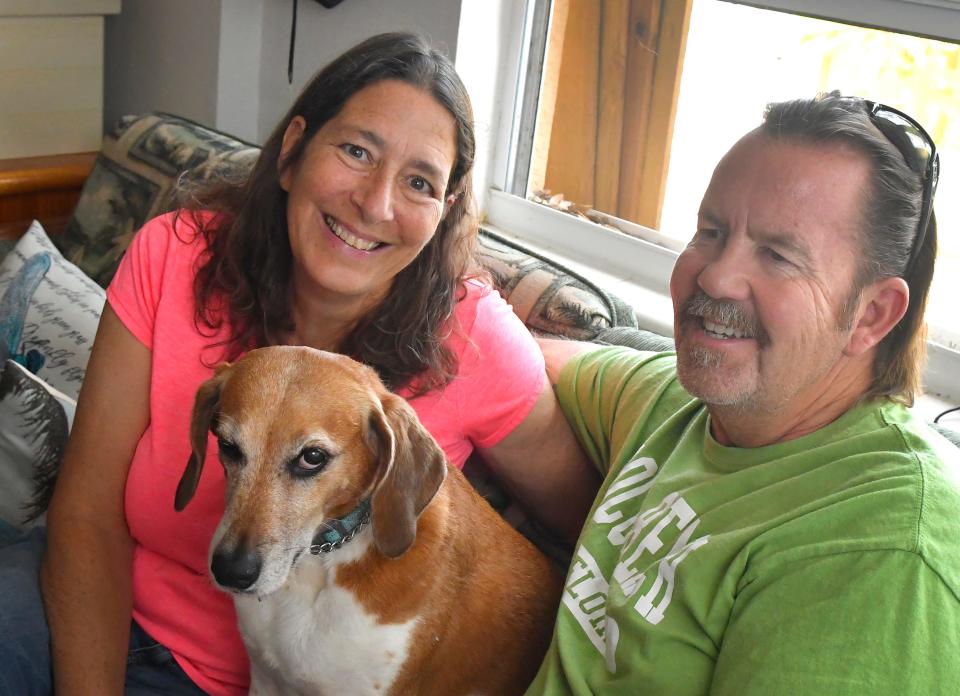
Norma developed COPD and Parkinson's over the years.
And then in 2020, as happened in countless families nationwide before vaccines were available, COVID hit home.
Paige, a UPS driver, was tested on June 28 after running a high temperature. Michelle immediately went into caregiver mode.
"As he was getting tested, I divided up the household so that I would have a space, Mom would have a space and and he would have a space, where I would be kind of in the middle of things," said Michelle, who's diabetic and had presumed that if one of them were to get COVID, she'd be the one.
In the middle she was — or more precisely, in the thick of it. She fixed the meals. Texted with her husband. Once, she was so worried about Paige that she wore a plastic comforter case to go in "his" room and check on him; another time, she entered the room wearing a page protector, gloves and a rain jacket.
Then, as Paige recovered, Norma, 85, entered what would be the last months of her life.
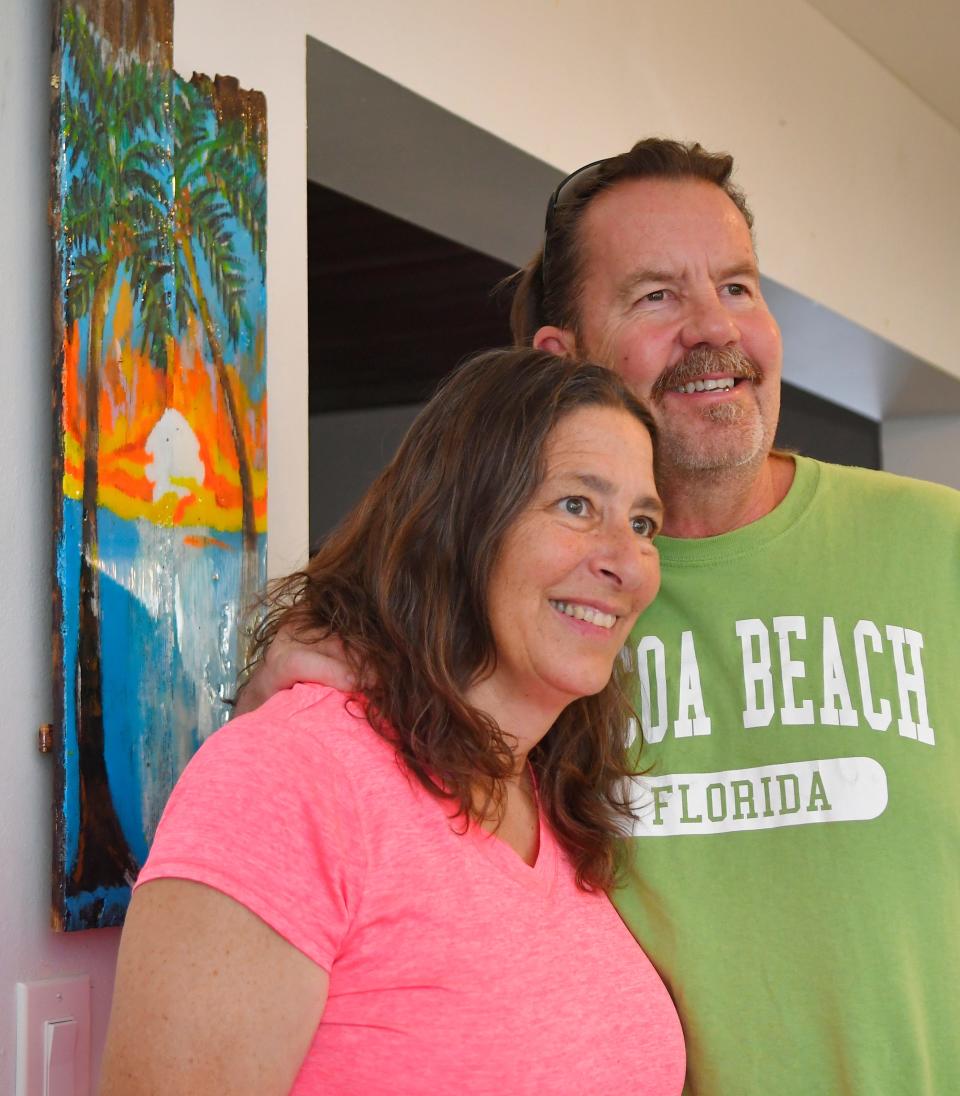
All along the rocky path, the couple took note of those little things families learn, under stress, about each other, about life, about facing the unknown with dignity and humor.
One day, it might be that Norma — a one-time flight attendant who was fired when she got married — thought she had a flight to Dallas. One morning, Michelle found her mother fighting to pull off her oxygen, worried about a wedding she needed to get to. Michelle assured Norma that no one was getting married at 8 a.m., and that she'd get details for her from the bride. By later that day, the wedding was forgotten.
Michelle also marveled at the "conversations" her mother had during her final weeks.
"Our family's not religious or spiritual. I've always just thought everything's black after death, but the number of people who 'visited' her who are gone ... that was amazing," Michelle said.
"One day, she said, 'Mommy and Daddy are coming to take me to heaven.' And there was the conversation she had with my sister, who had passed from HIV-AIDS six years ago ... I'm just more open now. When you die, I think, that energy has to go somewhere."
The year of recovery and reckoning bonded the Greens in a way that maybe even they didn't see coming.
Paige is still working to regain the lung function he had before his illness. He remembers too well the fear he harbored while ill, of leaving Michelle alone.
He's grateful, he said, for his wife. High-school sweethearts in Minnesota who reunited later in life, they've been married for 16 years.
"She got me to be a better person, forgiving, not always about me. I really do what she does now ... kind of see where I can help or give my time. She does this all the time, unselfishly. That really affects you," he said.
Michelle shared moments from her family's journey on Facebook. Toward the end of her mother's life, the posts grew more poignant.
"Mom stopped being interested in food last week. She slept almost 24 hours a day," she wrote one day. "Saturday she woke up not quite herself but chatty and lovey."
That Saturday night, Michelle wrote, "She began dying."
Norma passed away on Oct. 5, at home, as she'd always wanted. Michelle and her sister, Julie Cross of Minnesota, were at their mother's side, literally, crawling into bed with her. Norma had newly painted toenails, courtesy of Julie, and wore her favorite pajamas.
"We just lay in bed there with her while she was passing ... between when she stopped breathing and when her heart finally stopped," Michelle said.
"I always did kind of think that I'd just walk in her bedroom one day and she'd be gone. That we could do it this way, be with her ... I'm just so glad that happened."
Michelle kept her promise to her mother. She and her husband grew stronger through the fear they faced, and overcame, together.
And she's grateful.
True community outreach
Nobody turns down socks.
That's how Officer David Porter puts it, talking about working with the homeless population as one of the Palm Bay Police Department's two community resource officers.
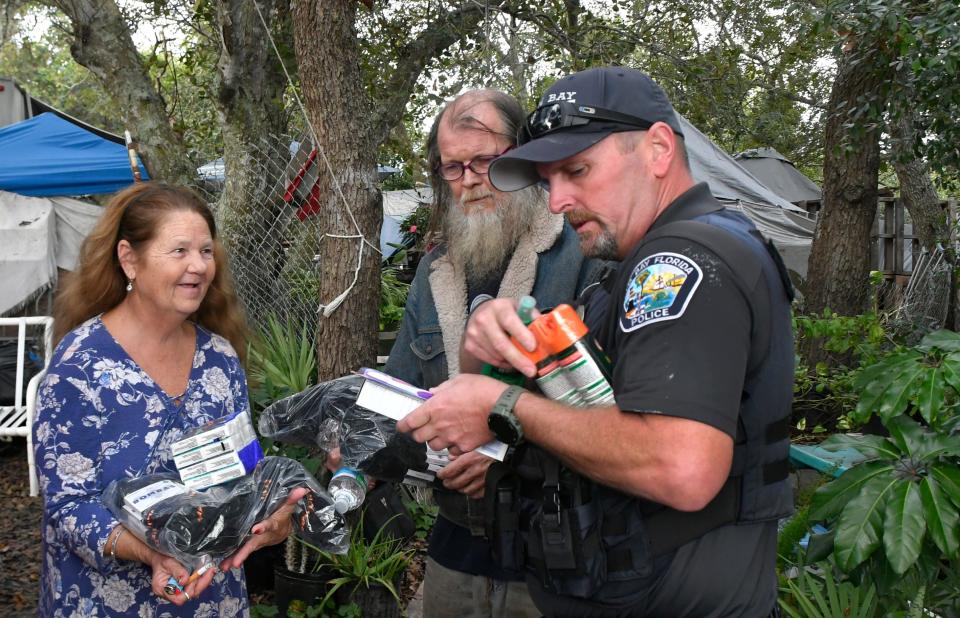
So many times, it's not food that's needed most.
"We have a lot of sources for food. It's the little things that you don't think of that they need," said Porter, surrounded by boxes stuffed with donated items at the Palm Bay substation off U.S. 1.
"Bug spray. Batteries. And socks ... no matter how crappy you feel, how good does it feel to wake up in the morning, peel off a pair of dirty socks and put on a fresh, brand-new pair?"
Porter couldn't do his job, he said, without members of the community he's called home for eight years, with support from groups like the congregations at CenterPointe, Tomoka and other churches. Individuals. Agencies focused on housing the homeless, whose numbers countywide totaled 940 during the Point in Time headcount in January 2020.
"I'm impressed with this community, No. 1, and how people wants to come together and help," said Porter, a Virginia native who's been in law enforcement for 23 years.
"We've got a lady who emailed us just today — she's in a knitting group and has a list of stuff she wants us to come by and pick up."
It's not all socks and gratitude, though.
Porter and his partner, Ryan Austin, are the department's only two community resource officers in a city of more than 120,000, although plans are in the works to increase their numbers.
There are rough days for the officers: dealing with those who cause property damage. Aggressive panhandlers. The mental illness issues that can escalate into life-threatening situations without intervention — and the questions, at every turn: Where can we send this person for help? Who has the resources to address this person's issue? Porter's seen officers pool their money to get a hotel room for a family on the street when no other option was available.
And that's on top of neighborhood watch and HOA meetings, and school threat assessments and a slew of other tasks, including homeless task force meetings, with agencies like Daily Bread and Volunteers of America, who are "trying new things, really trying their hardest to do what they can" and churches, whose partnerships are invaluable, he said.
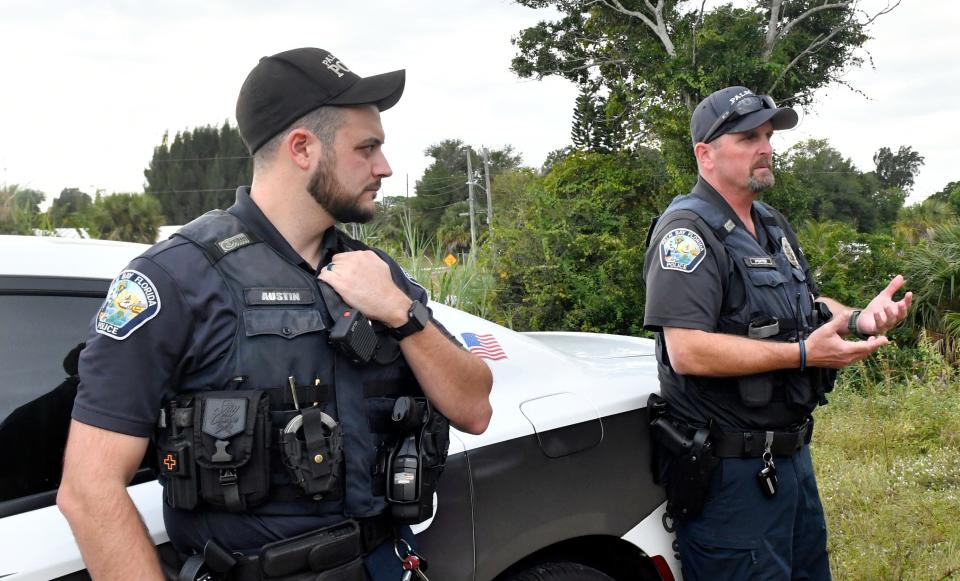
Most of the complaints about the homeless come from people who "just don't understand," Porter said.
"They just say, 'There are homeless people out there. Get rid of them.' But we go out and meet them, learn their story, and see if we can get resources from the agencies we work with ... So the camps that we have, they know us — when they see us walk in, they're not afraid."
And those kinds of relationships benefit all involved, he said.
"You do get to see good outcomes," Porter said. "A year or two ago, there was a complaint about a baby in a camp. Right away, people assumed the baby was being neglected because it was in a camp. It wasn't. The mom was taking care of the baby ... they had shelter, they had food, they had everything they needed to provide that child with a safe environment. Just because you don't live in something with a roof over your head ... we worked with them.
"DCF got involved because of the initial contact, but eventually, the family got housed. Later, I was doing outreach with one of our local churches and the family was at the street-side showers. And the little baby was about 3 now, running around, as healthy as could be."
It's a different world for Austin, who's been in this unit for just a year — but one he appreciates getting to know.
"I think the biggest thing I've taken from this unit is that I feel like a real member of the community," he said. "It's a lot different from the night shift, where you see so many bad things happen. I've learned a lot from Dave about the homeless outreach ... the meetings are eye-opening, since it's not something I dealt with on nights."
On Veterans Day, with rain threatening, Porter and Austin headed to the woods to visit with a couple, Thomas and Elizabeth. The two are in their 60s. They live in a small trailer that can be pulled behind their truck, with tents set up for other shelter. Thomas is an Army veteran and the two exist on disability checks.
Austin, standing back watching as Porter talked with the couple, admired the woman's plant-growing ability. A couple of cats scampered around, one watching from the roof of a tent.
The couple took the water and bug spray with a thank-you.
But they oohed and aahed over the socks.
Nobody turns down socks, after all.
The Brevard community comes through for those in need, year after year, Porter said.
"It's amazing how when something happens and you put the word out there, especially on social media, they jump on board," he said. "They go above and beyond and get the stuff that we need."
And he's grateful.
Filling hearts, stomachs
When Dorothy Linson, better known as "Ms. Dot," serves her annual pre-Thanksgiving luncheon, everyone with a hunger for good food and good company shows up at the table.
At least that's the way it appears year after year as she dishes out love along with the meal.
She does the bulk of the cooking — green beans. Macaroni. Turkey. Ham. Stuffing.
But her heart, countless people will attest, is just as outstanding as her culinary skills, which are legendary beyond the borders of the south Brevard community that knows and loves Ms. Dot.
And oh, is she grateful — for blessings she finds too many to count.
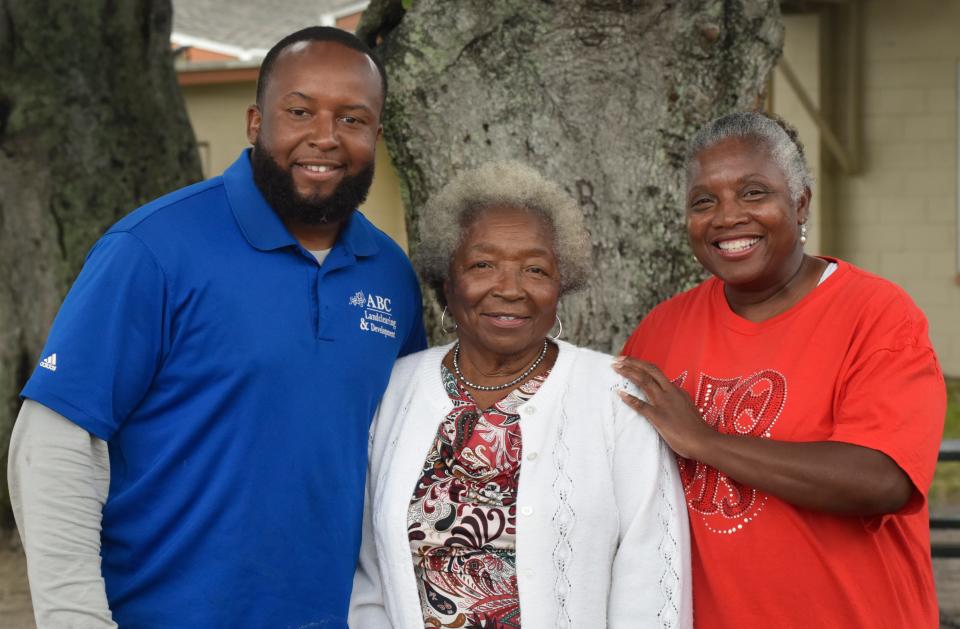
One of 12 children, she picked cotton in the fields as a child in Alabama along with her siblings and her parents, Carrie Lou and Marion King, who were sharecroppers.
She remembers a truant officer coming to the field when she was around 9, asking why she and her brother weren't in school. They didn't have shoes, she told the officer, who talked with her father and said someone would be back the next day with footwear. And that while he knew the family had to do their work, he'd make sure that Mr. King didn't get in trouble for sending his children to school.
All these years later — she's 83 now — Ms. Dot values education and the power of sharing.
"My parents told us, whatever you have, share with those that are in need," she said.
"I always say, God allows me to do this because of what I didn't have. I remember telling my mother this, and I was about 7 years old: 'Mom, if I live to get grown, I'm gonna get me a job. And my children, I want them to go to school. I don't care what it takes from me for them to go to school.' And I said, 'I will always have plenty of food.'"
Ms. Dot never finished the education she so craved, having five children by 21. Raising her children on her own, and winding up in Florida after a brother who'd been in the Navy settled in the Sunshine State, she tried to go back to school. She was so exhausted, between working cleaning houses and taking care of her family, that she just couldn't make it.
But she insisted that her children be schooled, watching them go on to college and in a couple of cases, the Army.
And the job Ms. Dot seemed destined for came about when an employee of the Lipscomb Street Community Center saw her walking one of her children home and asked: 'Miss Linson, would you like a job?'
"And I said sure, because I was just cleaning houses," she said. "I went and filled out the application the next day."
She was hired for the community center job, which was with the county at the time, and would go on to work with children as they came to the center after school.
It was at the Lipscomb center — where she would eventually retire as a recreation supervisor after 34 years with the city of Melbourne — that she not only found her calling, she found senior citizens coming in hungry for the kind of body-and-soul nourishment she's thrived on all her life.
"Some would have a little lunch in a bag. Some didn't have anything. And it just inspired me, knowing that some of these elderly people were really not having good meals at least twice a day, and not three times a day," Ms. Dot said.
So she started preparing food. Sometimes, just chicken and rice, and some vegetables.
"And at lunchtime, around 11:30, I would say, 'Is everybody ready to eat?" she said. "And they would say, "Yay, Dotty Dotty.'"
"I didn't realize how much that they needed that meal ... they would eat everything. They would get finished and say things like, 'Thank you so much for our dinner today. I don't care if I don't get supper tonight.' And I started doing it each week."
The annual Thanksgiving meal started there in south Brevard during Ms. Dot's time at the Brothers Park community center, between Lipscomb stints. She remembers her supervisor saying: "Dorothy, these people act like they're really hungry." She told him: "They are hungry."
And it grew from there each year, from a gathering of immediate families to "bigger. And bigger." Family pitched in. Volunteers and donors stepped up. She went back to Lipscomb to work there. The luncheon grew even bigger.
At one point early on, Ms. Dot started to see white people come for the pre-holiday feast, sitting down with Black residents who were regulars: "That's what I wanted," she said. "I just wanted people to come in and sit down together and just enjoy that meal."
In 2020, when meals had to be served drive-through style because of COVID-19, she cooked, among other dishes, 21 turkeys and 39 gallons of green beans. More than 800 dinners were served before volunteers ran out of food — "I cried," Ms. Dot said — but volunteers headed out to buy chicken at Sam's Club and Publix "so that no one left hungry." This year, cars were lined up around the park as the luncheon started, with volunteers expecting to serve even more than last year.
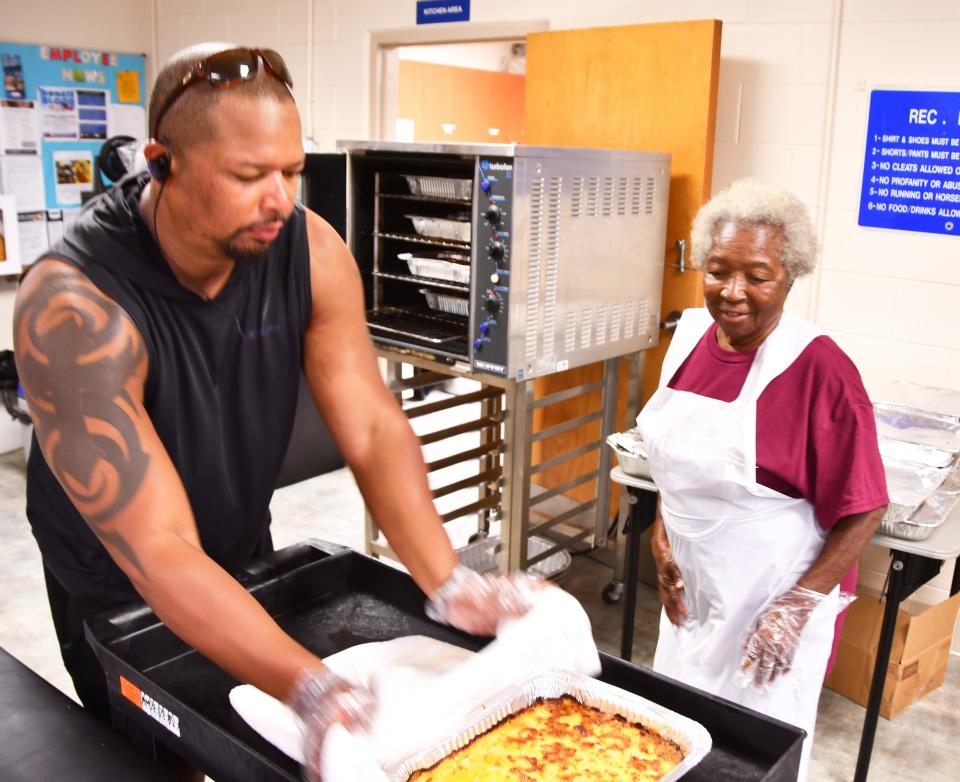
One of her daughters, Pat Pearson, was, as always, at her side.
"It brings me joy. That's where I get my giving from ... I hate homelessness and hunger, and I live my life so that I can be a blessing to somebody," Pearson said.
Ms. Dot would, she said, "like to be an example for the whole world, the children and the adults, because not only children need some direction, there are adults who need it, too."
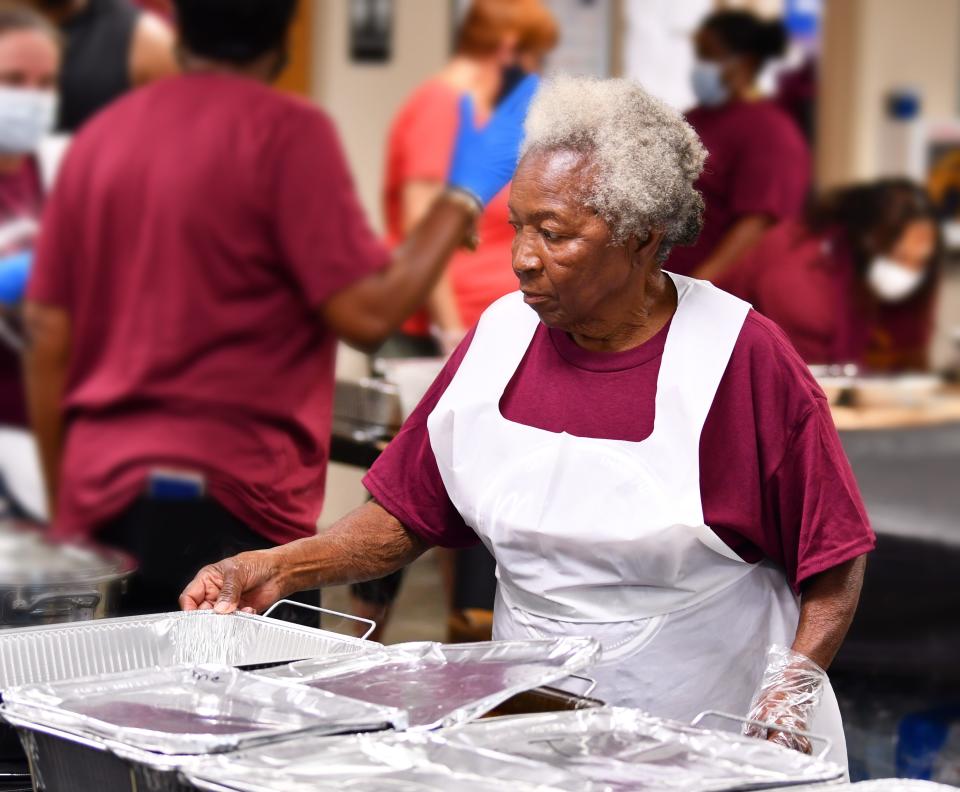
"We were poor, we had nothing. And what makes me thankful today ... when I look back over my life where I came from, I get joy just talking about it," she said.
"Because if I came from where I came from, and I can reach out to help somebody, I want somebody to look at me and say, 'If Ms. Dot did it, I should be able to do it also' ... that's the example that I tried to set."
For her endless blessings — and always, for enough food to feed anyone who's hungry — she's grateful.
Contact Kennerly at 321-242-3692 or bkennerly@floridatoday.com. Twitter: @bybrittkennerly Facebook: /bybrittkennerly.
Support local journalism and become a subscriber. Go to floridatoday.com/subscribe
This article originally appeared on Florida Today: Meet four Space Coast residents who are grateful -- even this year

